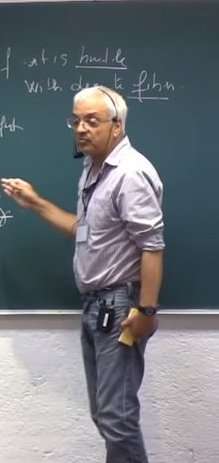Zoghman Mebkhout
Zoghman Mebkhout (born 1949[1] ) (مبخوت زغمان) is a French-Algerian mathematician. He is known for his work in algebraic analysis, geometry and representation theory, more precisely on the theory of D-modules.
Zoghman Mebkhout | |
|---|---|
 Zoghman Mebkhout at CIMAT | |
| Born | 1949 Mécheria, Algeria |
| Alma mater | University of Paris 7 |
| Known for | Perverse sheaves |
| Scientific career | |
| Institutions | IMJ-PRG |
| Thesis | Local cohomology of complex analytical spaces (1979) |
Career
Mebkhout is currently a research director at the French National Centre for Scientific Research[2] and in 2002 Zoghman received the Servant Medal from the CNRS a prize given every two years with an amount of €10,000.
Notable works
In September 1979 Mebkhout presented the Riemann–Hilbert correspondence,[3] which is a generalization of Hilbert's twenty-first problem to higher dimensions. The original setting was for Riemann surfaces, where it was about the existence of regular differential equations with prescribed monodromy groups.
In higher dimensions, Riemann surfaces are replaced by complex manifolds of dimension > 1. Certain systems of partial differential equations (linear and having very special properties for their solutions) and possible monodromies of their solutions correspond.[4] An independent proof of this result was presented by Masaki Kashiwara in April 1980.[5]
Zoghman is now largely known as a specialist in D-modules theory.[6]
Recognition
Zoghman is one of the first modern international-caliber North-African mathematicians. A symposium in Spain was held on his sixtieth birthday. He was invited to the Institute for Advanced Study[7] and gave a recent talk at Institut Fourier.[8]
Alexander Grothendieck said that Mebkhout's name was hidden and his role neglected in an operation headed by Pierre Deligne in the Luminy congress in June 1981. He calls it "a great disgrace of the mathematical world of this century" and is one of the reasons of Grothendieck's departure from mathematics.[6]:106
References
- Conference on D-modules in Honor of Zoghman Mebkhout´s 60th Birthday. January 26–29, 2009. Seville (Spain)
- "Institut de mathématiques de Jussieu".
- Zoghman Mebkhout (1980). "Sur le problème de Hilbert-Riemann". In D. Iagolnitzer (ed.). Complex Analysis, Microlocal Calculus and Relativistic Quantum Theory — Proceedings of the Colloquium Held at Les Houches, Centre de Physique Sep. 1979. Lecture Notes in Physics. 126. Springer. pp. 90–110. doi:10.1007/3-540-09996-4_31.
- Mebkhout, Zoghman (May 7, 1980). "Sur le problème de Hilbert-Riemann". Complex Analysis. Lecture Notes in Physics. 126: 90–110. Bibcode:1980LNP...126...90M. doi:10.1007/3-540-09996-4_31. ISBN 978-3-540-09996-3.
- Faisceaux constructibles et systemes holonomes d'équations aux derivées partielles linéaires à points singuliers réguliers, Se. Goulaouic-Schwartz, 1979–80, Exp. 19.
- Alexander Grothendieck, "Récoltes et sémailles, Réflexions et témoignage sur un passé de mathématicien." Archived October 13, 2013, at the Wayback Machine
- "Zoghman Mebkhout". Institute for Advanced Study. Retrieved 2019-02-27.
- "Zoghman Mebkhout | UMR 5582 - Laboratoire de mathématiques". www-fourier.ujf-grenoble.fr. Retrieved 2019-02-27.